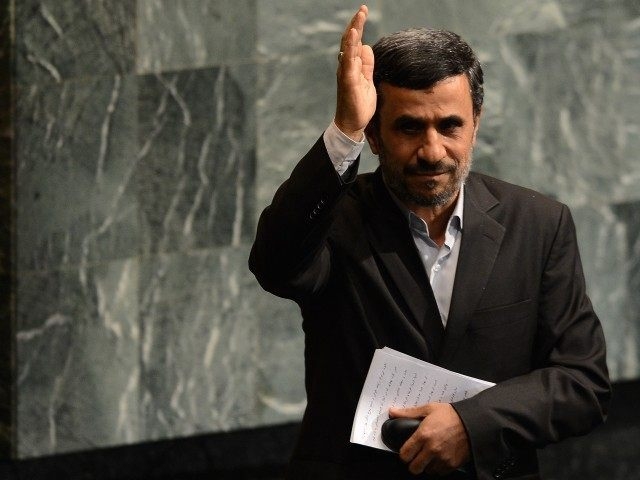Dear Donald: Ahmadinejad's letter and the not-so-secret Iranian fondness for Trump

Donald Trump’s first month as US president has been characterised by chaotic authoritarianism and judicial push back, prompting speculation that the new US president lacks the temperament and wherewithal to translate his ideological vision into practical policies.
Trump's vision of economic nationalism is music to the ears of Iranian leaders who have spent nearly 40 years extolling the virtues of self-sufficiency in the face of relentless globalisation
But on one issue Trump has been remarkably consistent. Early in his bid for the presidency, Trump staked out an anti-Iranian position by describing the nuclear accord as the worst deal ever, a position which he continues to repeat.
Trump is also highly critical of Iran’s regional role to the point that his rhetoric on this issue mimics that of Saudi and Israeli leaders. The US president has apparently followed through with his rhetoric by increasing the number of American military advisors and drone strikes in Yemen to aid the Saudi-led military campaign against pro-Iranian Houthi rebels.
Lack of respect
Underlining Trump’s anti-Iranian position is his strong belief that the Islamic Republic disrespects the United States.
According to Trump, this lack of respect is most evident in the militarised arena of the Persian Gulf where small Iranian gun boats regularly encounter US vessels, sometimes in adversarial circumstances. Prior to his winning the election, Trump claimed that he would have those boats “shot out of the water”.
It is an open secret that the leaders of the Islamic Republic are impressed by Trump’s proven anti-establishment credentials
Although sanctimonious in tone – for instance, the letter advises Trump to reform America’s electoral laws and to respect the rights of other nations - Ahmadinejad nevertheless appears pleased by Trump’s election on account of the latter’s triumph in the face of stiff opposition by the American establishment and deep state elements.
The key questions centre on the prevalence of these attitudes in the Islamic Republic and to what extent (if any) they can be filtered down into policy making processes, producing potential surprises in Iranian-US relations in the next four years.
Ideological affinity
It is tempting to read too much into Ahmadinejad’s personal motivation in writing to Trump. After all, the two men share much in common: they both invoke eccentric leadership styles and appear embattled in the face of an oppressive establishment. Moreover, both men espouse a grand revolutionary vision without paying sufficient attention to moderating institutional forces.
Beyond Ahmadinejad’s faction, even leading establishment clerics have been relatively restrained in their criticism of Trump
Yet Ahmadinejad represents a substantial body of opinion in the Islamic Republic. Often characterised as a maverick principlist, the former president leads a strident, right-wing faction that is often at odds with the conservative establishment. Derided as the “deviant current” (Jareeyaneh Enherafi), this faction espouses thinly-disguised anti-clerical sentiment with a view to maximising its populist appeal.
While Ahmadinejad has been effectively barred from contesting May’s presidential elections one of his leading allies, former head of the presidential centre, Hamid Baqai, is expected to run as a candidate provided he is not disqualified by the Guardians Council.
Beyond Ahmadinejad’s faction, even leading establishment clerics have been relatively restrained in their criticism of Trump. Following the latter’s election in November, Tehran’s provisional Friday prayers leader, the usually bombastic Ayatollah Seyed Ahmad Khatami, struck a distinctly moderate tone by urging the new US president to stay true to his word by not embroiling America in new Middle Eastern conflicts.
Even Iranian leader Ayatollah Seyed Ali Khamenei has been remarkably cautious in his assessment of Donald Trump. Khamenei first appeared to favour Trump immediately before the latter’s election, and then more recently he thanked Trump for exposing the “true face” of America.
But what is the source of this apparently sympathetic view of Donald Trump? It is an open secret that the leaders of the Islamic Republic are impressed by Trump’s proven anti-establishment credentials, as evidenced by his deteriorating relationship with the powerful US media.
Furthermore, Trump’s neo-isolationism, characterised by moderating America’s footprint on the global stage and reducing American commitment to Nato and, by extension, the perpetuation of Western political-military dominance, chimes with the Islamic Republic’s long-term geopolitical aspirations.
US-Iranian detente?
Despite Tehran’s relatively favourable view of Trump, a significant shift in US-Iranian relations is unlikely to take shape for the foreseeable future. By the same token, a sharp escalation of tensions leading to limited military conflict is equally unlikely.
It may be that even an eccentric and impulsive figure like Trump is unable to disrupt the deep-seated forces which keep Iran and America in a state of controlled Cold War
Any serious analysis of US-Iranian relations must take sufficient stock of the deeply entrenched institutional forces in both countries which perpetuate the nearly four-decades-old Cold War between the two states.
In this period, a long list of unwritten rules and implicit understandings have emerged to manage this cold war with a view to preventing it from spiralling out of control. It is noteworthy that during this remarkably long period, the US and Iran have not only avoided major military conflict but, in fact, have actively accommodated each other’s vital interests in the region, notably in post-Baathist Iraq.
While there is no pressing reason to believe this state of affairs will not endure under the Trump administration, one potential problem is that, as the US steadily reduces its presence in the region, American policy shifts into closer alignment with Saudi and Israeli attitudes. This risks a spike in US-Iranian tensions which, in turn, increases the scope of knee-jerk reactions and unintended consequences.
In the final analysis, it may be that even an eccentric and impulsive figure like Donald Trump is unable to disrupt the deep-seated institutional and ideological forces which keep Iran and America in a state of controlled cold war.
- Mahan Abedin is an analyst of Iranian politics. He is the director of the research group Dysart Consulting.
The views expressed in this article belong to the author and do not necessarily reflect the editorial policy of Middle East Eye.
Photo: Former Iranian President Mahmoud Ahmadinejad (AFP)
Stay informed with MEE's newsletters
Sign up to get the latest alerts, insights and analysis, starting with Turkey Unpacked
Middle East Eye delivers independent and unrivalled coverage and analysis of the Middle East, North Africa and beyond. To learn more about republishing this content and the associated fees, please fill out this form. More about MEE can be found here.







